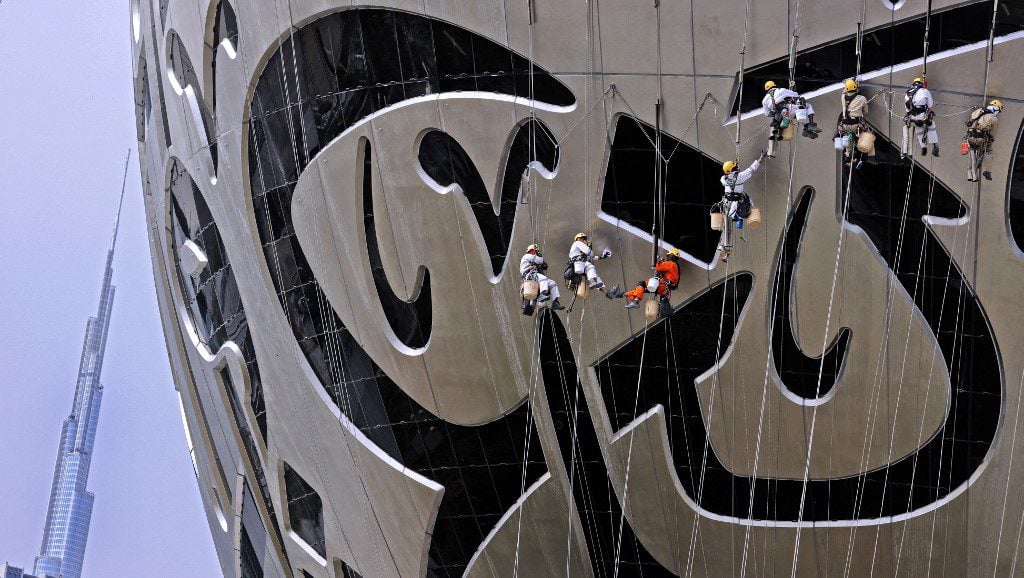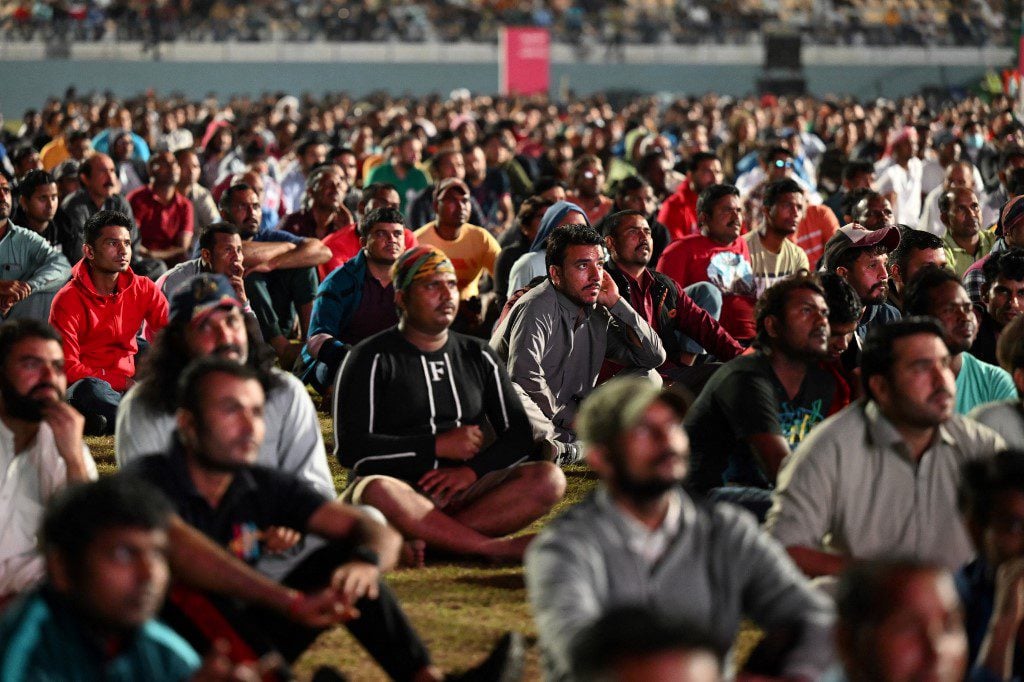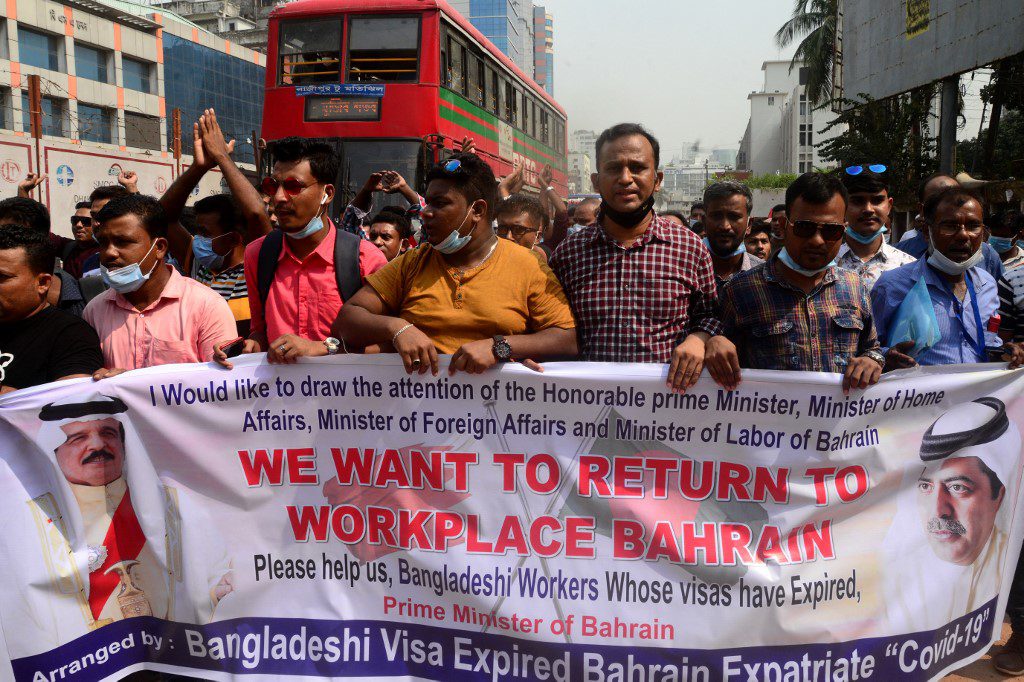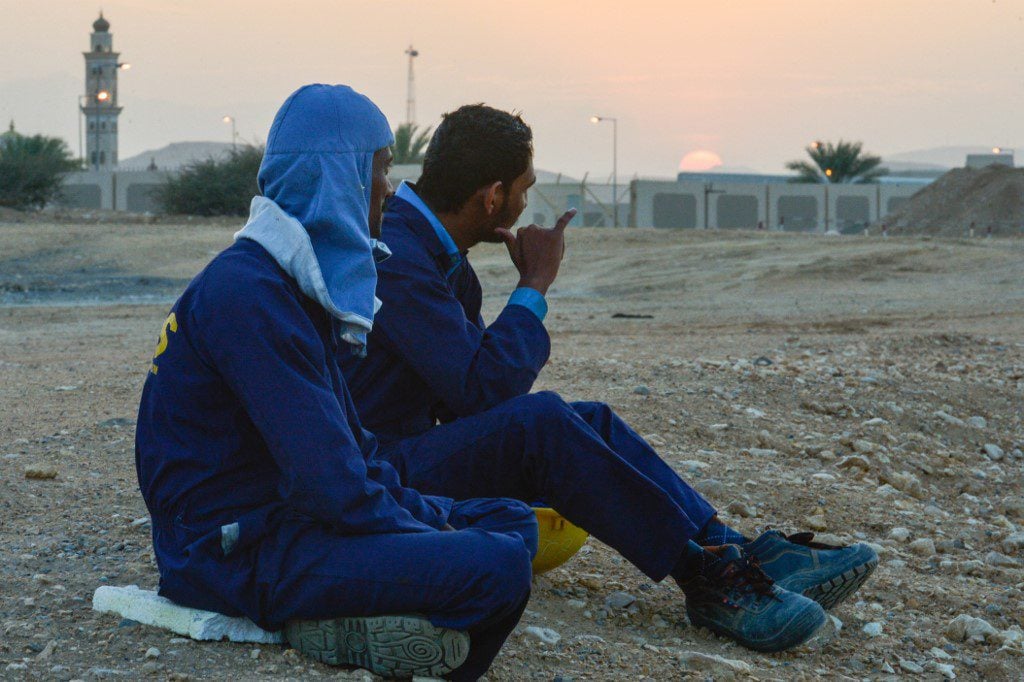While kafala itself is relatively similar in each country, and workers face similar issues, reforms are advancing at varying rates.

Introduction
The 2022 FIFA World Cup, hosted in Qatar, has shed light on migrant rights and labour conditions in the Gulf. While the construction of the tournament’s infrastructure has been associated with wage theft, injury and death, Qatar has been quick to highlight its reforms. It was one of the first countries to effectively dismantle the controversial kafala system, a visa sponsorship system that ties workers to their employers.
Under kafala, meaning ‘custodianship’ or ‘guarantee’ in Arabic, migrant workers depend on their kafil ‘sponsor’ for their employment and immigration status. Active not only in Qatar, but also in the other GCC member states, Lebanon and Jordan, kafala often does not allow workers to change employers or leave their host country without the sponsor’s permission. This has left the mostly low-income workers from Asia or Africa vulnerable to abuse.
Cases of exploitation and abuse enabled by ‘kafala’ are rife. Due to the unequal power relationship with their sponsor, who is also their employer, workers often face injustice in case of any exploitation or abuse by the latter. This vulnerability has driven civil society to seek reforms in the countries where the kafala system still exists.
While kafala itself is relatively similar in each country, and workers face similar issues, reforms are advancing at varying rates. In this article, Fanack will give an overview of how kafala has been reformed across the region, and what challenges lie ahead in terms of improving workers’ rights.
Reforms throughout the region
Qatar
According to the Planning and Statistics Authority, in the first quarter of 2022 there were 1,967,011 expatriate workers in Qatar, or 94 per cent of the total workforce.
Qatar announced the end of the kafala system in 2019. In August 2020, it introduced a non-discriminatory minimum wage. It also abolished the need for exit permits and No Objection Certificates (NOC) meaning that employees do not need permission from their sponsors if they want to change employers or leave the country. The latter was a first in the region. This concession also applies to domestic workers not covered by the country’s labour law. However, they will have to notify their employer 72 hours before departure.
Before labour reforms were introduced, workers subject to wage theft or other workplace disputes had minimal means to lodge complaints. However, Qatar has taken steps to improve workers’ access to justice. After a new online complaints platform was established, worker complaints to the Ministry of Labour more than doubled to 25,000 between 2021 and 2022. Most cases turned out to provide favourable outcomes to the worker.

In addition, several reforms are underway for domestic workers, including a dispute resolution training programme and revised standard employment contracts with the ability to sign contracts before departure from the home country.
Migration observers worry that the reforms are mostly linked to the pressure of being under a global lens, while being criticised for the treatment of migrant workers.
“Qataris resent this criticism and want the world to talk about how great and sustainable [their infrastructure is],” said one migration expert who was not authorised to speak on behalf of her organisation. There is concern, she explained, whether those reforms will continue after the World Cup, and the country is no longer under a global lens.
The International Labour Organisation (ILO) has said that more guidance is still needed around grievance mechanisms. Some organisations go further and say the kafala system still exists in practice, if not on paper, as employers are trying to find loopholes in the new law to continue their control over migrant workers. In addition, workers face harsh penalties if they ‘abscond’, or leave their employer without their permission.
The British NGO Trades Union Congress (TUC) is one group calling for more action, such as supporting the creation of a safe place to bring cases, raising the minimum wage, increasing enforcement efforts and making joint worker committees mandatory for all companies.
Kuwait
In 2018, there were over 620,000 migrant domestic workers in Kuwait; 90% of households employ an overseas worker. Migrant workers account for 85 per cent of the workforce. Their employment is riddled with inequity, with some earning lower salaries for the same job due to their nationality. Unsafe conditions are among the harms experienced, as is physical and sexual abuse of domestic workers.
Compounding this discrimination, in 2013, Kuwait approved a law segregating state-funded medical services with separate times for citizens and expatriates.
In 2020, Kuwait introduced a law banning the issuing or renewal of work permits for migrant workers aged 60 and over and with a secondary education diploma or lower. The law put the residency at risk of many who had been living in Kuwait for decades. While it was abolished in 2021, high residency fees for this group, deemed discriminatory, have left them with an extra burden.
Kuwait has implemented some reforms: the government, for instance, issued a new standard contract for migrant workers and an administrative decision the following year allowed some to change employers without getting their consent after three years of service. These reforms excluded migrant domestic workers. However, a 2015 law gave them some basic rights e.g. a weekly day off, 30 days of annual paid leave, a 12-hour working day with rest, and an end-of-service benefit and overtime payments. A minimum wage was also introduced.
However, human rights organisations have noted that such protections are still weaker than the national labour laws and still lack enforcement mechanisms and sanctions for lousy employer practices. Absconding is still an arrestable offence, which means an employer can always claim the worker ran away, breaching visa conditions. In Kuwait, as well as in other countries, the latter issue jeopardises any positive effects of reforms.
Bahrain

According to the European Centre for Democracy and Human Rights (ECDHR), more than 600 thousand of the 1.6 million inhabitants of Bahrain in 2019 were migrant workers – around 54.7% – working mostly in construction, retail and wholesale. In addition, almost 92 thousand domestic workers, mostly women, served Bahraini households.
The process to dismantle the kafala system in Bahrain started in 2009 but only in 2016 the government announced it would take effect the following year. The ‘Flexi-Permit’ was then introduced, allowing migrants with irregular status to self-sponsor, eliminating the need to be tied to one employer, and extending the system to the gig economy. Several human rights organisations lauded the new scheme as a big step for workers’ rights. The US State Department ranked Bahrain as Tier 1, meaning that a country is fully compliant with minimum standards for elimination of severe forms of trafficking.
However, the ‘Flexi-Permit’ was criticised for its high permit costs and lack of labour law protections that still lended exposure to abuse.
The government scrapped the Flexi-Permit after opposition from parliament and the private sector – for perceived competition between freelance migrant workers and Bahraini businesses – to be replaced by a new one.
Although its details are still unclear, a new scheme will be implemented by the Labour Market Regulatory Authority. It will involve setting up labour registration centres to facilitate worker registration, dispute resolution and linking of professional work licences to standards and qualifications. It will only be available for certain professions. People coming over on visit visas will also no longer be able to convert them to work visas, which some say is significant because of the exploitation the visit visa lent itself to.
Be that as it may, kafala has not been abolished like the government promised in 2009. Employees need to complete at least one year with their employer before they can leave without permission. Domestic workers still need their sponsor’s permission at all times.
According to a 2022 ILO report, the Labour Market Regulatory Authority, even in the ‘Flexi-Permit system, still allowed employers to limit a worker’s right to transfer to another employer.
A migration expert who spoke to Fanack on condition of anonymity, explained that despite efforts underway by UN agencies to advocate for extending social protection to migrant workers, especially in light of the lessons from the COVID-19 pandemic, kafala is still a sensitive issue.
Oman

According to Gulf Migration, expatriates accounted for 77 per cent of the workforce in Oman in 2020. Most migrant workers came from India, Bangladesh and Pakistan. They mostly worked in construction, retail, and households.
Also in Oman, the kafala system leaves workers trapped, powerless and vulnerable to exploitation.
In 2022, the Sultanate came under fire as a hotspot for trafficking, including from African countries such as Liberia, attributed to kafala.
In April 2019, workers at a prominent construction company were left unpaid for almost a year. While the company had failed to renew their work permits, the workers ended up paying the price, being stuck in their labour camps for fear of the police.
In 2020, the Oman government announced that migrant workers could transfer sponsorship without a no-objection certificate from their sponsor after two years. Previously they were banned to re-enter the country for a period of two years.
The reform has yet to impact many ‘enslaved’ in Oman, where there is no recourse available and forced labour is not treated as a crime.
According to Migrant Rights, before the 2020 reforms, Oman’s sponsorship transfer policy was “the most restrictive in the region”. This in contrast to some of its neighbours, where migrants have been allowed to switch employers after completing their contracts. The organisation said that in those cases, workers’ earnings increased by over ten per cent and the wage gap between nationals and expats in the private sector was reduced.
Human Rights Watch has said that despite announcing reforms, there has been little progress in migrant rights in Oman and enforcement measures don’t exist in effect. In addition, like in other Gulf states, ‘absconding’ is still a punishable crime.
Saudi Arabia
Saudi Arabia attracts migrant labour from Africa and Asia, including in the construction and domestic servitude sectors. On average, a domestic worker will clock up around 63.7 hours a week, the second highest rate in the world – on average. Estimates can go up to 100 hours per week.
The kingdom has announced a series of reforms over the last couple of years. Migrant workers have been allowed to switch jobs upon the expiry of their work contract or during a contract if they provide the requisite notice period. Exit authorisation for travel was also set to be removed under the announced reforms and redress mechanisms for lacking contracts and unpaid wages were to be implemented.
However, according to the migration expert speaking to Fanack on condition of anonymity, information on the implementation of the reforms is hard to come by.
Migrant Rights points out that the reforms only benefit those already protected under labour laws.
“Domestic workers, farmers, shepherds, guards, & private drivers, who are among the least protected segment of the workforce are excluded,” says the rights group. It also says that exit authorisation reforms still do not stop the employer from knowing when the worker leaves the country.
United Arab Emirates
The United Arab Emirates (UAE) relies significantly on migrant labour, particularly in Dubai, where almost 90 per cent of the emirate’s 3.1 million inhabitants are expatriates. They mostly work in the construction and service industries. While the UAE likes to imagine itself as forward-looking, it has come under fire for being built off of mistreated and exploited work.
International organisations have acknowledged reforms but abuses still occur.
Reforms include attempting to regularise the migrant labour recruitment market and removing exit permit and no objection certificate requirements. There have also been increased grievance remedies.
The challenges are implementation and enforcement. The long-standing problems of trafficking for sexual exploitation and forced labour have not ended. Neither have extortionate fees or other forms of exploitation and abuse like non-payment of wages, despite measures by the government to ensure correct (electronic) payment.
In 2022, the UAE announced an unemployment insurance plan that included migrant workers. However, the scheme will not include domestic or temporary workers. Migrant Rights also says that the scheme will “run into contradictions” unless the kafala system is abolished. That is because migrant workers cannot stay in the UAE unless they have a sponsor, so if they lose their job, they only have 30 days before leaving the country.
This indicates that reforms, in the UAE as well as in the other states, often do not come to fruition unless the root of the kafala system is being dealt with: workers’ dependency on their employers, creating an unequal power relationship.
Lebanon
Migrants tied to the kafala system in Lebanon are mostly women who work as domestic workers. However, their circumstances and rights are often determined by whether they have run away (and sometimes working as freelancers) or are still tied to the same household they were sponsored by.
In theory, contracts are renewable by mutual agreement every year but the practice is that workers get a two or three-month trial period and then stay indefinitely. There are cases where their employers have refused to send them home, so they end up enslaved inside their sponsor’s houses.
In particular, workers who do not stay with their employers have an irregular status and therefore, their rights are most precarious. However, they either remain in the country because they have built a life there or have no other choice. Going back to their country of origin without savings or a degree would make it difficult for them to integrate back into society. For live-in workers, they risk being abused by their employers, going without pay for long periods and being denied contact with their families.
Patricia Silwan from This is Lebanon, a civil society organisation exposing abuse in Lebanon, told Fanack about a particularly long standing case in Lebanon, where someone had been stuck there for 21 years, unpaid and without contact with her family. “Running to the police is often not an option because they can be accused of theft by their employers or even returned to their abusive employers”, she said.
Civil society calling out the system says it has been created as a result of insensitive policies around migration and labour. In their view, migrant domestic workers should ultimately have all the rights other workers enjoy.
Some progression occurred when the Labour Ministry adopted reforms of the Standard Unified Contract (SUC) on 8 September 2020, which would have allowed for key amendments, such as a 48-hour work week, a day off, overtime or sick pay and annual leave. Conditions regarding pay were also set and would allow the worker to end their contract without their employer agreeing. However, the SUC reform was halted after an organisation lobbying for recruitment agencies submitted a complaint. Reportedly bowing to the interests of that lobby, Lebanon’s Shura Council suspended implementation of the reforms.
Nevertheless, reform has been deemed insufficient. Non-profit KAFA has argued that kafala must be abolished and domestic workers should be protected by the national labour laws, from which they are currently excluded. KAFA and other stakeholders in Lebanon are currently working on a draft law to include sufficient protections for domestic workers to present to the parliament at a later stage.
As many workers struggle to get home, they may find themselves in the country long term. There are domestic workers in Lebanon still at the age of 60 because it has become their life, but precariously because of their exclusion from Lebanon’s labour laws, according to Ghina al-Andary from KAFA. “Especially if there is no pension or safety. If they were included in the labour law they would have those rights.”
Jordan
According to figures from the National Center for Human Resources Development, there were 341,041 registered migrant workers in the country in 2017. Some 70,000 domestic workers were active in the country in 2020.
In Jordan, the kafala system, although not explicitly named as such in law, operates similarly to its variants in the GCC and Lebanon but it only applies to migrant workers recruited by nationals and not to those working in the Qualified Industrial Zones (US free trade zones) in Jordan.
Migrant workers in Jordan need permission from their employers to terminate employment, to transfer to a different sponsor or to leave the country. Workers interviewed by ILO indicated that they desire to be responsible for their own sponsorship and have more freedom over their fate, as has been tried in Bahrain. Some told ILO that the kafala system has restricted them in terms of mobility and has left them vulnerable to extortion. Others, like Syrian refugees, see it as a way to acquire legal status.
Over 75 per cent of the expat workforce does not have any work permit and only 17 per cent have official sponsors. Others rely on the black market, giving them slightly more freedom, but rendering them more vulnerable.
Wage disparities between native and migrant workers exist, with discrepancies between their respective minimum wages. And although some protections exist for migrant labour, e.g. limitation to work hours and placing the onus of permit fees on the employer, enforcement is difficult and abuses, especially endured by domestic workers, have been well-publicised.
While a standard contract was established in 2003 and forced labour was criminalised in 2009, further reforms have been limited.
The ILO reported in 2017 that there were moves by the Jordan government to provide some flexibility in the agriculture sector by allowing cooperatives to become sponsors. That means, to some degree, workers can move between jobs, although the mechanism of moving between jobs is susceptible to bribes.
The agriculture and domestic work sector have a separate labour code and what little flexibility attained for migrant workers was a result of union measures, such as the Agricultural Workers’ Union (AWU). They were encouraged by the pandemic and climate-induced food scarcity and greater interest from donors.
At the same time, the garment making industry, three-quarters of which is made up of migrant workers, is undergoing reform through a four-phase strategy that started in 2008, forecast for completion in 2027. The strategy aims to address some of the abuses that occur in garment factories, introducing a new sector-wide collective bargaining agreement, a unified contract for garment migrant workers and compliance with the labour laws. In addition, it aims to combat wage discrimination between local and migrant workers, pre-hiring pregnancy tests and migrant labour recruitment fees.
In general, there is still a power imbalance between migrant workers and employers, who can cancel the former’s legal residency at any time. In 2017, there were around 10,000 labour-related deportations. Rather than progressive reform to strengthen migrant workers’ position, there is proposed public sector reform that involves dissolving the Ministry of Labour and distributing its functions across several other departments. That risks deprioritizing labour reforms further.
Therefore, civil society is calling for the delinking of work and residency permits and a stronger union so that AWU and similar are officially recognised.
Unequal power relationship
Reforms of kafala, the scope of which varies by country, are all subject to implementation and proper enforcement. In addition, reforms are not comprehensive; thus, remaining problematic laws, such as the absconding law, are a permanent threat to a worker.
While some countries now allow workers to leave their employers without their permission and have abolished the need for exit visas, more changes in policy and law are needed. Employees wanting to leave need more protection, to avoid risking retaliatory measures by their employer. In addition, workers will need more support in finding a new employer, particularly as they have a limited timespan in which to find a new sponsor.
Many workers could be stuck in limbo if they run away, or if their sponsor fails to renew their visas. This shows that with the kafala system essentially still in place, workers remain in a position where they are dependent on the whim of their employer, who is often the only one who can renew their visa and their legal stay in the country.
The abusive nature of kafala is not an isolated phenomenon, suggests al-Andary, who advocates in Lebanon where domestic workers are known to suffer from sexual harassment and violence. “Try and see it within the whole cycle. Exploitation does not start in Lebanon. It is not separated from the male violence and the exploitation of women as a whole.”
Despite ongoing, albeit slow, reform in the GCC with policymakers discussing social protection measures including mobility savings accounts, the fact that the kafala system is so difficult to reform or even exists in the first place is indicative of broader factors.
With the native population a minority in most of the Gulf states, high youth unemployment and the drive towards diversification, these states are under pressure to diminish the reliance on expats. Not offering any formal route to citizenship, permanent residence or state pension schemes serves that interest while the kafala system enables political control over the expat population.
According to a 2022 report by the Gulf Research Center, vested interests of different stakeholders have furthermore kept the system in place. Businesses take advantage of cheap labour, while workers are kept in a vulnerable position. Locals earn money through visa trading, charging workers for a visa.
On the other hand, allowing more labour mobility will lead to increasing productivity, as workers are in a better position and employers are encouraged to treat them well. In this way, talent is retained.
Since countries such as Qatar and Saudi Arabia increasingly develop megaprojects such as the World Cup, they will continue to depend on migrant workers for a long time to come. In this context, organisations such as Human Rights Watch, Migrant Rights and the International Labour Organisation continue to press for further reforms or even abolishing kafala entirely.

